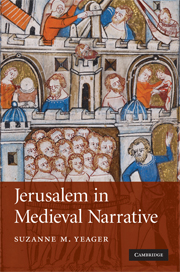Book contents
- Frontmatter
- Contents
- Acknowledgments
- List of abbreviations
- Introduction: texts and contexts
- 1 Pilgrimage to Jerusalem: three accounts by English authors
- 2 Craving heritage: portrayals of Richard I and the English quest for Jerusalem in Richard, Coer de Lyon
- 3 The crusade of the soul in The Siege of Jerusalem
- 4 The Book of Sir John Mandeville: text of pilgrimage and spiritual reform
- 5 Beyond the Celestial and Terrestrial Jerusalem: the Promised Land in western Christendom
- Conclusion
- Notes
- Bibliography
- Index
- CAMBRIDGE STUDIES IN MEDIEVAL LITERATURE
2 - Craving heritage: portrayals of Richard I and the English quest for Jerusalem in Richard, Coer de Lyon
Published online by Cambridge University Press: 22 September 2009
- Frontmatter
- Contents
- Acknowledgments
- List of abbreviations
- Introduction: texts and contexts
- 1 Pilgrimage to Jerusalem: three accounts by English authors
- 2 Craving heritage: portrayals of Richard I and the English quest for Jerusalem in Richard, Coer de Lyon
- 3 The crusade of the soul in The Siege of Jerusalem
- 4 The Book of Sir John Mandeville: text of pilgrimage and spiritual reform
- 5 Beyond the Celestial and Terrestrial Jerusalem: the Promised Land in western Christendom
- Conclusion
- Notes
- Bibliography
- Index
- CAMBRIDGE STUDIES IN MEDIEVAL LITERATURE
Summary
As seen in the previous chapter, English pilgrim narratives portrayed communal desire for Jerusalem through images of the Passion, and also through interactions with the religious Other. By comparison, the author of the poem, Richard, Coer de Lyon (sic), reorients the holy city in the English imagination as an acquisitive object as well as a pilgrim destination. Middle English versions of the text, written in the fourteenth and fifteenth centuries, narrate England's participation in the Third Crusade, and offer a revised look at twelfth-century crusading endeavors and the role of King Richard I of England. As I discuss here, the poet employs images of crusading and depicts Jerusalem in ways that express certain beliefs about Richard's English heritage. The poet portrays Richard and King Philip II of France united in a competition to own the holy city and to express mastery over the Christian troops. As Richard's powers increase throughout the romance, Philip, along with his men, behaves foolishly, to the extent that French devotion and military might are questioned and ultimately declared a liability in the Third Crusade. As I discuss here, such portrayals reveal perceptions of English religious identity and examples of crusade-inflected propaganda related to the Hundred Years War.
By creatively retelling the events of the past, the poem works to form what Benedict Anderson has termed the “imagined community,” as characteristics of what is considered “English” are held up against those which are not.
- Type
- Chapter
- Information
- Jerusalem in Medieval Narrative , pp. 48 - 77Publisher: Cambridge University PressPrint publication year: 2008



